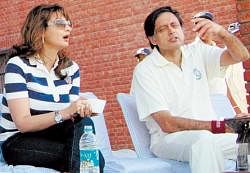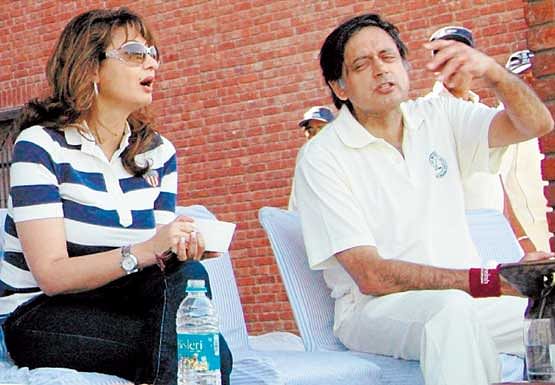

Of course, India's most celebrated mentor has been K Narayana Murthy, whose guidance to Infosys has taken the software giant to dizzying heights in the corporate world.
Clearly, Tharoor as mentor for the Kochi IPL franchise is nowhere near Murthy’s effort.
Murthy did not have to be “softened” up and given company by glamorous women to mentor his company and the many business minds Infosys has thrown up over time. Tharoor was not providing a guiding hand from big business to small.
By his several phone calls to IPL czar Lalit Modi, Tharoor simply tried to influence the process that would win the consortium the Kochi IPL team. In other words, Tharoor did what thousands of middlemen do in business dealings the world over. In turn, he was influenced – rather easily by the lure of a pretty face – to help the Kochi consortium. For all the contrived clean image that he has nurtured over the years, this one act of indiscretion could be his undoing. He might have some aces up his sleeve to stop his ouster, but he has surely fallen from grace.
Did he get a commission for his contribution? Or, was it parked in the form of ‘sweat equity’ for his friend Sunanda Pushkar who, it now seems, did not have to work too hard to net her fish? In fact, it must go to the lady’s credit that she could make such a killing for whoever employed her. An interview of the consortium's spokesman till the other day, Satyajit Gaikwad, in a web news portal is revealing in as much as it is full of contradictions. Gaikwad says Tharoor came into the picture after Kochi IPL won the bid in Chennai on March 21. But this comment has to be read with what he says about Sunanda Pushkar, the woman at the centre of the controversy.
Contradictions galore
According to Gaikwad, “She came to us in January while bidding was done in March. We came in touch with Tharoor only in March. We have hired professionals and they decided that we will hire Sunanda. She will do media management, brand building, collect advertisement and get franchisee fees. All these things she will provide for us”.
Now wait a minute. Gaikwad then goes on to say: “we have not hired her yet. We have only decided to hire her. We will hire her when we will get the team launched in (sic) the field”. If what Gaikwad says is true, then not just the consortium that owns the Kochi IPL team, but also Sunanda and Tharoor must come clean on the truth. Why was she given the 19 per cent (Rs. 74 crore) free equity if she is yet to be hired? The burden of revealing the truth is on every one involved in the Kochi IPL franchise, more on Tharoor-the-mentor since he holds a public office. For Tharoor to divulge when Sunanda came into the picture and since how long he has known her might be a little difficult for a man who is already in a spot of difficulty. If he did - truthfully - that would be a fate worse than travelling cattle class.
As the Modi-Tharoor spat has shown, the good and bad of cricket, even in its instant variety, are exquisitely balanced in the best and the worst of times. IPL is a story of deceptive politicians, taxpayer swindles, media slants, power of big money, and most of all, a system that serves the rich and powerful at the expense of the average fan, the average tax payer and the average citizen.
Far from the on-field lusty hittings, numerous television cutaway shots of dancing girls and Bollywood royalty, the shortest version of cricket has increasingly become a game being played in boardrooms and not in the stadia. The IPL operates in an atmosphere of private sector, billion-dollar corporate socialism. This iron triangle benefits not just the management (owners) and labour (players), but also the odd politician who throws in his weight behind those men – and sometimes women of unknown antecedents and gaudy charms – who work in the shadows to strike questionable deals laced with favour-giving and favour-seeking. They would stop at nothing: even employ two-bit off-shore men-managers to grab deals. It seems that by promoting IPL cricket so zestfully, the powers that be have, wittingly or otherwise, unleashed a monster: a competition that celebrates financial muscle with the occasional scam.
Fans lose out
What holds the IPL together is not just a cricket team, which is like a tiny parliament operating on a war footing, and not just the cult of winning. It is also held together by greed that has transformed the game beyond recognition – corporatise cricket. Add to this the prospects of television revenue and you have an extravaganza perhaps not seen, felt or experienced even in such American mega events as the National Football League or the National Basketball Association.
Bollywood glamour, big dollar business and now dirty politics have collided to give cricket a bad name. In a way, some would say, this was inevitable since there is little accountability and transparency in the financial wheeling-dealing that is the IPL whose captains know the right levers to pull or push in India's corrupt political power circles. The only thing that gained in stature and respectability is the price that comes with each deal struck and unstuck to be struck again. Already, backroom manoueuvres are on to buy out the King's XI Punjab team. As always with big business, the key is the price. Professional sporting franchises are like private governments that have little interest in accountability and far less interest in playing the game by the rules of the game. Like any other lucrative business proposition, a successful deal is struck by small groups of executives who employ a variety of stratagem – not always straight – to acquire a team.
The IPL player auctions in the last three seasons have undoubtedly thrown up the game's greatest talents, making many players rich beyond their previous dreams. But sweeping changes are necessary in the game's economics. The franchises must be held accountable in ways similar to those by which constituted local and national governments are answerable to the people. In some ways, that has already begun because the taxman is watching by the sidelines the vulgar play of money in which the sport and its client-consumers (fans) are the biggest losers.
Indeed, the taxman will not spare the “fixers” either. “We are going to chase that woman (you know who) till kingdom comes if she doesn't disclose her tax liabilities…We will act in a way she goes to jail” - that is from a top entral Board of Direct Taxes official.
Honest intentions, yes. But as long as there are politicians, who masquerade as suave and slick gentlemen with a weakness for good things in life, and who can pitch, field and bat equally well, the CBDT may just have to be content ambitious and elusive targets.